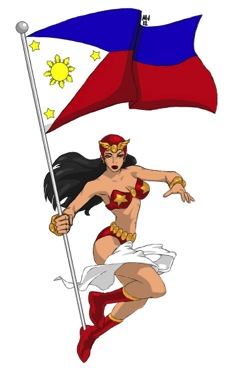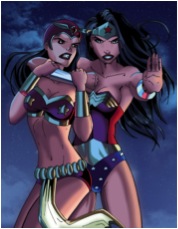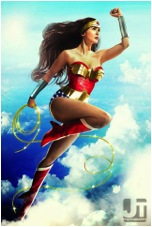Darna is often described as ‘The Filipino Wonder Woman’ and there are many persuasive reasons why such a comparison might be made. In the 1951 comic Darna is described as having ‘kisig ni Apolo at lakas ni Samson’ (which I translate as ‘the elegance of Apollo and the strength of Samson’ – Tagalog speakers, please correct me – I am still learning), which almost directly quotes Wonder Woman who was described in 1944 is ‘as beautiful as Aphrodite, wise as Athena, stronger than Hercules and swifter than Mercury’ (issue 38, 1944 quoted in Berlatsky’s book on Wonder Woman, page 139). Darna was later seen as a Wonder Woman clone when, in 1991, a film version showed her blocking bullets with bracelets. This became a key aspect of the character and was repeated in the 2009 television show.
Darna paratexts have encouraged the comparison; in 2013 Marianne Riviera, the current most recent Darna, posed in Wonder Woman cosplay for a magazine shoot. The comparison between the two is almost inevitable, and is dramatised in fan art such as that by Glee Chan.
Darna/Wonder Woman fan art by Glee Chan and Marian Rivera as Wonder Woman
Darna clearly borrows tropes from other American characters. Her powers are similar to those possessed by Superman. She transforms from her non-hero incarnation Narda into Darna by saying ‘Darna’, in a manner very similar to Captain Marvel saying ‘Shazam!’ That she is derivative is hardly surprising – many superheroes in the 1940s were variations on a well-established formula and the industry at the time did not particularly reward originality.
Conversely, there are those who maintain that Mars Ravelo, Darna’s creator, was pitching the idea of a female superhero in 1939, two years before Wonder Woman’s first comic book appearance. In such a timeline Darna is not a Wonder Woman clone, but a character who emerged independently around the same time.
I am not particularly interested in answering the question of which character came first. What does interest me is the question of why it matters. I believe that this is important because it is rooted in the artistic relationship between the Philippines and the U.S. Filipino comics. Both Filipino superhero comics and Pinoy Manga have often had to fight accusations of being derivative with the implication that Filipino comic book creators simply recycle the cultural work done elsewhere. If Darna is nothing more than the Filipino Wonder Woman, then, it follows, she has little value alone and can be subsumed into Wonder Woman studies. The argument that she exists independent to Wonder Woman, then, can be read as an assertion of Filipino national identity through comics.
One of the reasons why I find this interesting is that different incarnations of Darna seem to cycle between being an icon of Filipino identity and an outward-looking international figure. We have had English-speaking Darnas whose identity and attitudes are largely indistinguishable from an American equivalent, and we have had Tagalog-speaking Catholic Darnas whose enemies draw heavily from Filipino folk-law – see, for example, Roberto Feleo’s ‘Darna’s Fortress of Solitude’ (1987). It is noteworthy in this regard that in the original comics Darna looks distinctly Western, and the first actress to play Darna, Rosa Del Rosario, was biracial, as was Nanette Medved, who played her in 1991 and Anjanette Abayari who played Darna in two films in 1994.
So, is Darna more than a Wonder Woman clone? And, more importantly, does it matter?




Interesting article! Speaking as someone who lives in the U.S. I think Darna is unknown in the United States (a search for Darna comics on amazon.com came up with no results) but it’s interesting to learn that Filipino superhero comics goes back to 1939. I knew there were a lot of comic creators from the Philippines, some of whom are working for Marvel and DC, but I didn’t know the Philippines superhero comics went back that long.
Thanks for commenting. You certainly aren’t alone in not having heard of Darna before reading this. Despite a few attempts in film and comics to make a bilingual Darna, she has not had the international purchase some have hoped she would.
From what I have read, the Philippines has historically had quite a strong comics industry, mainly thanks to the American military presence.
Could you tell us a bit more about Darna’s origin/powers Phil? Or do they just vary widely from appearance to appearance?
I would be happy to. There are a few different versions, but in most incarnations Narda, a young girl, ingests a white stone from space and says the word ‘Darna!’ in order to become Darna. As Darna she has the powers of flight and super strength. To change back to Narda she says ‘Narda!’
“Both Filipino superhero comics and Pinoy Manga have often had to fight accusations of being derivative with the implication that Filipino comic book creators simply recycle the cultural work done elsewhere. If Darna is nothing more than the Filipino Wonder Woman, then, it follows, she has little value alone”
Which is an absurd notion. The Golden Age American Comics were all derivative of the Pulps. Except maybe Wonder Woman who was derivative of Latinized Greek Mythology. To me singling our Fillipino media for such an attack on their validity is simply Racist.
@JaredMithrandir – To be fair, from what I’ve noticed Filipinos have not shied away from eating American culture up with a spoon which I believe started back when US troops were stationed in the country.
That’s not to say that what they’re creating is lesser in any way, but there really is a very apparent striving to be more like the States, particularly in the media.
Which is just my personal observation from spending a good portion of my childhood there, and being half-Filipino myself. I’m willing to be proven wrong.
Philip, there is also the Indonesian Wonder Woman, Sri Asih (1953) by RA Kosasih, which I am sure you are familiar with.
http://www.goethe.de/ins/id/lp/prj/mic/mii/en8257083.htm
And Darna has evolved to Zsazsa…
http://en.wikipedia.org/wiki/Zsazsa_Zaturnnah
She is the main protagonist/heroine becomes the galactic warrior goddess & savior of mankind protector of the innocents against the forces of evil save the world & keep the peace & save the future of mankind. Thanks for the information. From:Wayne